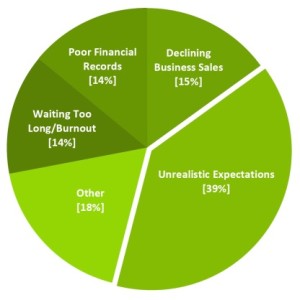Last weekend, I ran into an old friend who was a little frustrated. He said he is still trying to retire by exiting his business. He has tried twice and not succeeded either time.
It reminded me of the old saying that
“it’s easier to get into business than to get out of it.”
Many companies start with one individual and a unique skill set or base of knowledge. Thirty years later, that same person is running a complicated business with many employees, tremendous responsibilities, significant debt and the owner’s future at stake.

“Biggest Impediments to Successful Deals,” Market Pulse Survey, International Business Broker Association (IBBA), M&A Source and Pepperdine University’s Graziadio School of Business, Fourth Quarter 2013
For many business owners, cashing out of a business is a lifelong dream. For some, like my friend, exiting a business can be a nightmare. Most companies put up for sale are not sold. Those that are sold, very often disappoint the expectations of owners.
Why is it so difficult?
First, a business owner often has many stakeholders to satisfy—he or she must take into consideration senior management, staff, other shareholders, vendors and customers. Many owners don’t realize they can be caught between conflicting interests.
Second, transitioning out of your business for maximum gain is a multi-disciplinary process. There are so many factors to consider when transitioning the management, ownership and wealth of the business.
A business owner needs to combine many different types of expertise—legal, tax, accounting, estate planning, wealth management, human resources, etc. It is difficult for a business owner to put together the appropriate team, ask the right questions, and hold the team accountable. Having never done it before, too often the business owner doesn’t know what she or he doesn’t know!
Only by bringing the right brain power to bear and through careful planning can the interests of all stakeholders be taken into consideration and balanced.
Important Considerations
Here are some of the important considerations when preparing your company for transition to new ownership. This is often a difficult subject, for both financial and emotional reasons. But by planning early, you have much greater control of your future.

“Biggest Contributors to Successful Deals,” Market Pulse Survey, International Business Broker Association (IBBA), M&A Source and Pepperdine University’s Graziadio School of Business, Fourth Quarter 2013
The best way to address this huge issue is to approach it as you would any new project: Create a plan. Make a schedule. Give specific tasks to the appropriate people and assign completion dates.
Here are five things to consider:
- Spend sufficient time to polish up most or all aspects of the business.
- Build an experienced team of experts.
- Establish value based on multiple approaches, seek to understand the drivers to enhance valuation.
- Have audited records for the last two years.
- Develop your negotiating skills.
To succeed, try not to do these things:
- Overprice the business.
- Let the business decline because you’ve already started retiring
- Expect to be paid in cash and fail to consider some seller financing.
- Fail to consider the needs of key employees.
- Be unprepared to furnish all the appropriate documentation.
I’ve been part of several company exits, mergers and acquisitions. They are usually complicated when they succeed. I have seen a few owners think it was very simple, things went too well or the process was easy, then find the buyer couldn’t or wouldn’t perform according to the terms of their agreement.
Do you have a plan to successfully transition your business?
Have you considered the needs of your clients, staff and other key stakeholders?
Do you have a team of experts experienced in exit planning to assist?
Would you like to meet with me for a free consultation on your ideas for transitioning out of your business?
